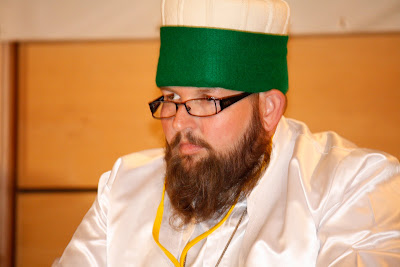The conference started on Friday 25 March in the five stars Sheraton Hotal of Tirana. The morning sessions were for political, social leaders and religious leaders. The Minister of Tourism, Culture, Youth and Sports, the rector of Tirana University and the rector of the Gülen-related Fatih University of Istanbul were the first speakers.

Paule Weller, one of the most outspoken Fellow-travellers
In the good Gülen tradition there was also one 'fellow-traveller' among the first group, Prof. Paul Weller of Derby University UK, a Baptist Minister, who was one of the very few people in the conference to speak in mild, fluid and pleasant English. We has to listen to sometimes good, often incomplete translations or to people who, like I myself, struggle with English as their second or third language.
The second morning session showed the Chief of the Muslim Community of Albania and his colleague from Kosovo. In the last decades the government has reassumed the Ottoman system of recognising chiefs of the various religious communities. Religious aducation seems to be still rather modest, but there is a special system for secondary schools, resembling the Imam Khatib Lysee of Turkey where a training for Imam (with much attention to Muslim rituals, chanting of the Qur'an, study of Arabic, Islamic law and history) is given besides secular education. The supervision for this type of school has been given to the Gülen community of Albania. Gülen people who were present at the conference were mostly involved in the 15 secondary schools that are labelled as 'Turkish Colleges', excellent secondary schools where a large part of education is taught in English, and where no religious education is taught.
Besides the Sunni leaders of Albania and Kosovo a representative of the Bektashi order was sitting. The latter (in white cassock) was quite impressive in body and dress, besides the tiny and modest Roman Catholic Bishop.
I talked to one student who confessed that he was born in a Bektashi family, but now turned into a practising Sunni Muslim: no alcohol, no visits to holy graves and not leaving the prayers and the fast of Ramadan to your shaykh but performing all this yourself.
The orthodox representative was not present on this first day of the conference, but he arrived on Saturday. 25 March is Feast of the Annunciation for the Orthodox and therefore they could not come the first day.

Mustafa Ozcan, rector of Fatih University in Istanbul, the most prominent institution of the Gülen Movement. We had the impression that the conference was brought together because of the finalisation of the first first grand building of its Albanian smaller equivalent, Epoka University.

Mons. Rrok Mirdita, Archbishop of Tirana, looking quite modest or even shy between the dignitaries of Sunni Muslims and Bektashi patriarchs

Haxhi Selim Muca, head of the Sunni Muslim community has known difficult times during the communist period, but he looks now as if his finest hour has come and he feel happy here.


The religious leaders did not speak in English, but in Albanian. I could have a quiet talk later with the Orthodox representative, but the Suuni and Bektashi representatives did not speak English and so communication was quite difficult. The Bektashi leaders as shown here had quite impressive attributes that were not yet clear to me, like many elements of the Bektashi spirituality also were unclear to most of my hosts. But from all of these it became clear that they stand for interreligious harmony, for good understanding of each other, besides promoting the interests of their own community, under supervision and direction of an open new Albania. All foster the dream of becoming a member of the European Union, that was often hears as a more or less messianic dream. Also the Ottoman policy of accepting the various communities besides official Sunni Islam, was often praised.
Geen opmerkingen:
Een reactie posten